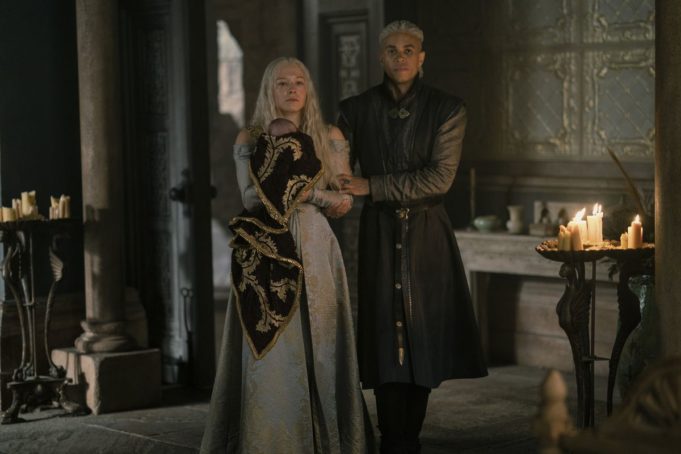After we watched the sixth episode of House of the Dragon, my girlfriend dived into A Wiki of Ice and Fire. The way they’re imagined by author George R.R. Martin, Princess Rhaenyra was known as being “thick of waist” and having a “large bosom,” because she never lost weight after her pregnancies, in contrast to Queen Alicent, who retained her pre-pregnancy figure. Clearly, HBO did not adhere to the source material, Martin’s Fire & Blood, when casting Rhaenyra — Emma D’arcy playing the adult princess does not fit the book’s physical description. The reason I bring this up is that nobody seems to be bothered about it and certainly not in the way some people are bothered — vociferously — about the Black actors who portray the Velaryons.
In “Fear of a Black Hobbit,” The Atlantic unpacked why — besides the obvious catering to a vocal minority of racist, conservative consumers — such backlash to adding a few nonwhite characters to any imaginary world exists in the first place. To sum it up: In addition to racist, conservative values, nostalgia is a hell of a drug, and an embarrassing number of cis, hetero, white men of a certain age — old enough to have seen Star Wars when it was still relatively new, plus or minus a decade — are just chasing the dragon of seeing a lightsaber on a big screen when they were little kids. In response, studio content has to keep giving these delicate, developmentally arrested fanboys an overabundance of heroes who look like them for fear that these racist dweebs will shout down their expensive intellectual properties’ content. Like blonde, willowy Galadriel jumping out of the elves’ boat or the ghosts who haunt the Freelings’ home in Poltergeist, these dudes just refuse to move on.
Often, the arguments of these reactionary nerds are couched in notions of “historical accuracy,” because IPs such as Martin’s or Tolkien’s universes are inspired by eras and places that have existed in the real world, and the “inaccuracy” of a nonwhite character in such a world somehow hampers their suspension of disbelief, thereby making it less likely that they will continue consuming any more of the IP’s related products. Really? In these shows that feature dragons and dwarves and elves and anachronistic mishmashes of sartorial choices and technology, the Black guy is the unbelievable part? You are mad that Corlys (Steven Touissaint), Laenor (Theo Nate/John Macmillan), and Laena (Nanna Blondell/Savannah Steyn/Nova Foueillis-Mose), who are not assigned a skin color in the book, are Black on the show? But not that the thicc mom Rhaenyra of the book is thin on TV?
Well, perhaps to the relief of these racist, reactionary shitheads, in “The Princess and the Queen,” the fact that some of these characters are Black matters narratively in this episode and in a way that the difference between Rhaenyra’s dress size in the book and the show does not. This episode’s title is the same as Martin’s 2013 novella about the civil war between Rhaenyra’s and Alicent’s factions, and in fealty to that novella, this episode is where their disagreement over the throne’s inheritance really kicks into gear, and it is precisely because Rhaenyra’s kids don’t look like Laenor, whom she married in the previous episode.
Because Laenor is assumed to be a white-skinned person in the book, the true identity of the father of Rhaenyra’s sons is said to be unclear, but on the show, much to the outrage of the world’s racist, conservative fanboys, Laenor is not only Black but gay. Yet he and Rhaenyra have children, the third of which she delivers in the opening scene. None of them share their presumed father’s skin tone or his silver hair. In fact, as Alicent (Olivia Cooke) insinuates to husband Viserys (Paddy Considine), her sworn protector Ser Criston Cole (Fabian Frankel) and later, castle gossip-monger Larys “Clubfoot” Strong (Matthew Needham), anyone with eyes can spot the resemblance of Rhaenyra’s boys — first-born Jacaerys (Leo Hart) and second-born Lucerys (Harvey Sadler) — to city watch commander Harwin Strong (Ryan Corr). Maybe Laenor tricks himself into thinking the boys might be his (and we are left to assume that he has made a token effort at the appropriate times to sire children on Rhaenyra), but when Harwin cradles Rhaenyra’s newborn in his massive, armored arms, well, Alicent’s right. Anybody with eyes can probably see the truth if they aren’t willfully naive.
Harwin, unfortunately, smashes any pretenses of naivete, along with Ser Criston’s face, after the knight makes a suggestive comment about Jacaerys’ parentage, right there in the castle yard, in front of a lot of people, most of whom will most certainly wag their tongues about it. Criston, charged with training the princes at arms, pits Alicent’s eldest boy Aegon (Ty Tennant) against Jacaerys, and it’s a pretty ugly spectacle, because Aegon is older and bigger and Cole has instructed him to win at all costs, fairness be damned. Harwin takes issue with this, and Cole remarks that Harwin’s reaction is of the intensity one might save for a brother, or an uncle, or a son.
Harwin punches the shit out of him, and it ripples through the plot thusly: His father, Lyonel Strong (Gavin Stokes), makes him return to the family seat at Harrenhal to resume his lordly duties and then resigns his own post as the king’s Hand (though Viserys refuses to accept it). With a clear understanding of what may happen as a result, Rhaenyra informs Laenor that they are “done here,” and they pack up their kids and go to Dragonstone rather than face the wave of calumnies sure to fall behind the fateful blows of Harwin’s fists.
Larys also makes a move. He goes down to the castle dungeons and grants clemency to some death row inmates for the low, low, low price of their tongues — and, yes, we are treated to a gruesome scene of tongs and a hot knife being used to cut a wretch’s tongue in half — as well as the completion of a task: Go to Harrenhal and secretly dispose of his father (Lyonel) and brother (Harwin).
When we see this squad next, they are hiding in the brush, watching the Strongs and their escort ride to Harrenhal. The camera pans down to a pin on one of their cloaks, wrought in the shape of the same firefly found on Larys’ walking stick. The scene cuts to a slumbering Lyonel, suddenly awakened by the smell of smoke and his son’s screams. A fire rages, and we see Larys’ cloaked men blending into the fire-suppression antics of the castle’s denizens.
The next scene is a montage of the Velaryon-Targaryen family approaching Dragonstone, followed by King Viserys, increasingly frail, watching a rat crawl across a mantle, followed by Harrenhal men-at-arms carrying a body on a stretcher as flames lick the scenery behind them. Over all of this, we hear Larys monologuing. “What are children but a weakness? A folly? A futility? Through them, you imagine you cheat the great darkness of its victory, that you will persist forever in some form or another, as if they will keep you from the dust, but for them, you surrender what you should not. You may know what is the right thing to be done, but love stays the hand. Love is a downfall.”
It turns out that he is telling all this to Alicent, and when she learns of the fire at Harrenhal, she is horrified, which is sort of funny given that in a previous scene, she essentially told Larys that the other Strongs had to go. But Larys’ musings about love and children might have been better suited for Daemon. He has spent the episode and however many intervening years there are between it and Episode 5 (10 years) as a guest of Pentos, proverbially crashing on the luxurious couch of a Pentoshi magister, along with the family he has made with Laena. Laena, heavily pregnant and way over living in exile, wishes to give birth back home at Driftmark, but Daemon, who is content to pore over the books in the magister’s library, has no desire to return to Westeros. Laena is anguished at her total lack of agency. Earlier, she told Daemon she wanted to die a dragonrider’s death rather than getting fat sitting on a couch. Dying from a breech birth, she stumbles outside, finds Vhagar, and commands the dragon to roast her.
Laena’s suicide-by-“dracarys” is the saddest scene yet, and in 2022, it’s a grim commentary on the state of bodily autonomy in the United States of America, that the only choice left to a woman with a problematic pregnancy is to die. Maybe I’m projecting, but even Vhagar seems to know this. Wizened and slowed by her ancient age, the dragon is initially unwilling to immolate her companion and bonded rider but finally accedes to her command in a melancholy reversal of the child-puts-his-beloved-pet-to-sleep trope. And this, like the show’s casting choices, is a departure from the book, in which they do in fact return to Driftmark, where Laena gives birth to a malformed son before dying from the complications on the tower steps. Yet I have not stumbled across a single furious rant or think piece explaining such rants about this cross-media departure. Oh, I’m sure they exist. But they don’t consume near the amount of oxygen that flaming over the Velaryons’ skin color does. And while it is sad to see an ancient, decrepit dragon resign herself to fulfill a desperate, tragic woman’s suicidal wish, it is downright dispiriting that a person of color cannot play any role they are qualified for without a legion of fearful, prejudiced blowhards being hateful about it.












